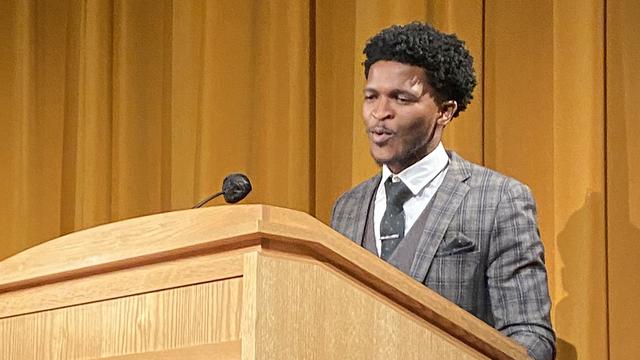Whose rights matter? That was the main question under discussion at a panel discussion April 12 hosted by the Humphrey School of Public Affairs featuring Siyabulela Mandela, a South African scholar and social justice activist who is the great-grandson of Nelson Mandela.
The younger Mandela is the regional project manager for East and South Africa at Journalists for Human Rights. He earned his PhD in International Relations and Conflict Management at Nelson Mandela University, which is named for his great-grandfather, the late former president of South Africa and Nobel Peace Prize winner.
Siyabulela Mandela is in Minnesota for a month-long residency at the College of Saint Benedict and Saint John’s University.
He joined panelists Nisha Botchwey, Dean of Humphrey School, Angela Rose, former president of the Minneapolis NAACP, Mark Ritchie, president of Global Minnesota, and retired Judge LaJune Lange, an expert on international law and human rights
Here are some key points from the discussion.
Siyabulela Mandela comments:
- While the United Nations adopted the Universal Declaration of Human Rights in 1948, those rights are still not defended equally across the globe.
- The current crises of the COVID-19 pandemic and the war in Ukraine once again expose the disparities between the rights of white/Caucasian people and people of color. For example, when Ukrainians began being evacuated when the war began, they were primarily white people who left first. Black people from Africa who were students in Ukraine were initially denied access out of Ukraine.
- In terms of the war itself, countries around the world are prioritizing ways to intervene and help resolve the conflict. But there has been no similar effort to help resolve conflicts happening in Africa, such as in the Tigray region of Ethiopia, South Sudan, the Democratic Republic of Congo, Syria, and other places.
- The same is true for how the world is addressing the pandemic. At a time when the world should have been united in terms of offering life-saving vaccines and treatments, the countries that had first priority to vaccines were primarily white countries. It will take almost a year before the African continent will have access to all of these vaccines.
- It's disappointing that many of the issues that Nelson Mandela spoke about decades ago are the very same issues – social injustice, systemic racism, criminal justice inequities – we’re still talking about now.
- This generation of young leaders has to build bridges that cut across color and racial lines. We must refuse to be defined by a system that oppressed our ancestors. We must refuse to live in a world that is segregated and separated. And we are going to wage our struggle against the injustices of our time.
Dean Nisha Botchwey comments:
- The question is: where do you as an individual begin to address these issues? Start with taking a step that you think is the right step for you. If you’re a member of a group or organization that is moving this work forward, start there. If you're not a member, maybe you become a member. If you sense there is no organization or nothing in place, start something.
- You're not going to build a bridge until you start to lay down the first brick. You cannot wait for someone else to do it, so how do you move forward? Start with your passion. Start where your heart is, where your community is.
---
This event was cosponsored by Global Minnesota, the Eugene J. McCarthy Center for Public Policy and Civic Engagement, the Minnesota Honorary Consul for South Africa, and the Interdisciplinary Center for the Study of Global Change.


